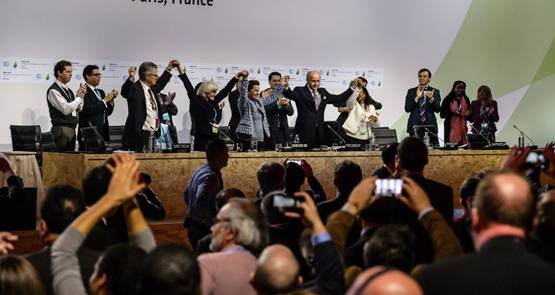
Early on Sunday morning Melbourne time, parties at the climate conference in Paris struck a new international deal to prevent the rise of global temperatures by 2 degrees — but pressure is now on for the Australian government to alter climate policy and live up to its promises.
Some in the conference had called for the world to hold the average global temperature increase to below 1.5 degrees, but the final agreement calls for a limit to simply “well below” 2 degrees, and for the 196 party countries to pursue efforts to limit the increase to 1.5 degrees.
To achieve that, countries have agreed to cut emissions “as soon as possible”, with developing countries allowed more time to start cutting their emissions. Countries have agreed to “undertake rapid reductions” to reach emissions neutrality in the second half of this century.
There will also be a fund of at least US$100 billion a year from developed countries, including Australia, to fight climate change from 2020.
Foreign Minister Julie Bishop, who was in Paris for the negotiations, described it as a historic agreement, but one that “no country would see” as a perfect outcome.
When Prime Minister Malcolm Turnbull made the case for his colleagues to lead the Liberal Party in September, he pledged to retain the conservative climate and same-sex marriage policies held by Tony Abbott. But some in the far right of the party have already begun to grumble that the Paris deal means the government’s policy is changing.
Liberal MP for Hughes Craig Kelly posted to Facebook that the deal was a “farce”. Climate sceptic Liberal MP Dennis Jensen told the ABC that the agreement was “a lot of hype about essentially nothing”.
Labor’s spokesperson for the environment and climate change, Mark Butler, said the agreement left Australia at the back of the pack on emissions reductions: “We have no five-yearly target whatsoever, no target for 2025 and instead of a commitment to net zero emissions by the middle of this century we have a target from this government of net zero emissions by the end of the century.”
James Hansen, the man considered to be the father of climate change awareness, told The Guardian that the agreement was “bullshit” and just “worthless words. There is no action, just promises”: “Basically countries set their own targets and there’s no enforcement strategy.”
Climate Institute CEO John Connor said it had been an “ugly process” and the agreement wasn’t perfect, but the net-zero emissions target was clear, and the Australian government “had played a mostly constructive role in Paris,” which was not matched by the domestic politics. Current emissions reductions targets in Australia would mean Australia would be the highest per-capita polluter in the G20 by 2030.
The Australian Conservation Foundation said the agreement was “a big positive step”, but also said it was in contrast to the approval of the Adani Carmichael Coal Mine in Queensland, and the plans to shut down the renewable energy agency ARENA and the Clean Energy Finance Corporation.
Last week it was revealed a ban on wind power investment instituted by Abbott on the latter had been lifted, and the CEFP had committed to funding $67 million to Australia’s third-largest wind farm in Ararat, Victoria. Jensen also expressed concern about this decision, and its impact on the deal Turnbull made to become prime minister: “Well, it’s something I’m going to have to think about personally a fair bit more and certainly I’ll be speaking to colleagues about it as well.”








The Paris Meetings have achieved at least one significant advance. The world’s leaders have accepted that it is our responsibility to zeroise our emissions.
The weasel word “net” as in “net zero emissions” will be abused extensively as accountants struggle to invent negative carbon to balance their books to net zero. I hope the world’s environmentalists will be vigilant to such cheating.
Ditto to James Hansen’s dismissive assessment.
Words are cheap, we need international leaders with foresight who are willing to put money where their mouths are.
Roger Clifton, you say the world’s leaders have accepted that it is our responsibility to “zeroise” our emissions. Please explain the meaning of that word, and what it entails.
Your optimism in hoping “the world’s environmentalists will be vigilant to such cheating” is stunning, in that they’ve yet to show any evidence they understand very much about the complexities of Climate Change.
zut alors, you really need to understand that foresight doesn’t mean blind acceptance of your faiths.
Norman Hanscombe: “Your optimism in hoping “the world’s environmentalists will be vigilant to such cheating” is stunning, in that they’ve yet to show any evidence they understand very much about the complexities of Climate Change.”
A bizarrely broad brush there Norm.
Rpinglis – please don’t fed the troll. It only exists when people, out of pity, take notice thinking that it is merely benighted when in fact it is deranged, drowning in solipsistic solecisms.
Hands up all who believe that BigCarbon is suddenly going to start playing nice.
Hmmmm…